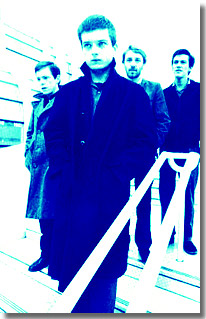
| Search JoyZine with Google Site Search! |
|
New Order © Jill Bardinelli
New Order's refusal to compromise is legendary, be it their music or their firm decisions to do record covers and videos that are artistic but are rarely available for viewing.
Q: Where does your reputation for being rude in interviews come from? PETER: Don't believe everything you read! Obviously, you've been reading the English press. It's a very British thing... there's a really jealous attitude towards any success. It's very strange. If an English guy sees you in a Rolls-Royce, he'll smash it up. If an American saw it, he'd say, "That's great, I want one." Q: A girlfriend of mine has this theory that the bass player in the band is always the bad boy. PETER: That's quite a cheeky theory. Actually, I appreciate the analogy. I've always found bass players to be the hardest-working. I always used to drive the van for the group. You're the first one up in the morning, you have to load the gear. The band gets pissed because you wake them up. You can't get pissed because you have to drive. I went to a gig with Echo and the Bunnymen once. Guess who was driving their van? The bass-player. They end up being the most reliable and doing the most physical work. Now your friend's analogy as a woman might be valid. "I'll go for the bad boy and charming, please." Q: Are you married? PETER: No, never; but I do have two children. With my last girlfriend, we actually set a date (to get married). Then it went strictly downhill. We broke it off. You find people's true attitudes when you argue over little things. I still love her, though. I was actually looking forward to hanging up my boots and saying, "Yes, go for it." Q: That doesn't sound too bad-boy to me. Do you miss being a punker? PETER: Attitudinally, I still am in some ways. It shows in my attitude toward promotion and music. We never used to do any interviews. We came from a punk background, so we felt the music should speak for itself and not be surrounded by all that bullshit hype. Q: New Order's blend of dance and rock had many people calling you the spiritual godfathers of Jesus Jones and EMF. PETER: I like EMF's attitude. But as far as Jesus Jones, I think that's disgusting. If we were the spiritual godfathers of Jesus Jones, I'd be hanging up my guitar. I think they're rubbish. Q: The band is very involved in their ownership of the Hacienda, a Manchester dance club with a rave atmosphere. How do you see the rave philosophy? PETER: I've always found the rave philosophy in England to be, "Let's play some good music and forget our problems." Q: But do you feel there's more to rave than just having a good time? PETER: I don't go to Hacienda to worry about politics. I don't go to a rave to change the world. I go to chat with girls. Q: What do you think American kids are finding in punk today, almost 20 years after it started? PETER: We've got all that happening in Manchester in a place called Afflecks. It's like the punk-goth's hangout. They're relating to the fashion. Punk isn't trying to change music anymore. The original punks bought the Sex Pistols record to shock their parents. Imagine if my daughter came home wearing a dog collar. I'd probably be laughing because that's what I did to shock my parents. Q: I like punk music for more than just the clothes PETER: You listen to punk for enjoyment, just like I listen to the Velvet Underground. I recently met (the Clash's) Mick Jones for the first time. I was a bit drunk and he came up and asked how I was. I'd never met him, but it was very nice. I was quite surprised he knew me—I'm a bit more shy and retiring. He's one of my heroes. I would never have gone up to him, like, "Hi, how are you?," like he did. You know, that fear of rejection. Q: Can New Order ever have the same degree of impact on people's lives that fans say Joy Division did? PETER: I don't know, really. Maybe when New Order finishes, people will say that. Do you think people would be saying the same cerebral stuff about Joy Division if they were still going? You always want what you can't have. It's more mysterious that way. |

 Their roots are in the seminal Mancunian group, Joy Division—a forerunner for everyone from the Smiths to My Bloody Valentine—which splintered on the eve of their maiden U.S. tour, with the tragic 1980 suicide of lead singer, Ian Curtis. The remaining members have carried on, though, and their current Republic album, their first since 1989's Technique, is a major surprise. It sounds like a 1983 new wave album for anybody who used to collect
Their roots are in the seminal Mancunian group, Joy Division—a forerunner for everyone from the Smiths to My Bloody Valentine—which splintered on the eve of their maiden U.S. tour, with the tragic 1980 suicide of lead singer, Ian Curtis. The remaining members have carried on, though, and their current Republic album, their first since 1989's Technique, is a major surprise. It sounds like a 1983 new wave album for anybody who used to collect